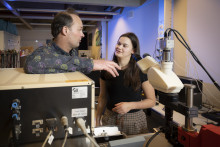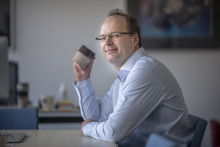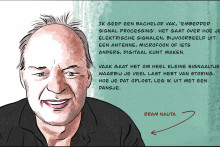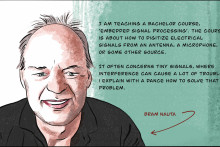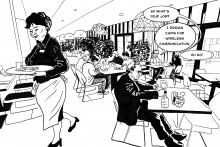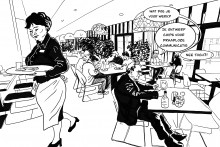Tara van Abkoude, currently enrolled in the first year of her Master’s in Electrical Engineering with a specialisation in telecommunication, is originally from Eindhoven. She was inspired during a job fair at her high school. ‘There were two electrical engineers standing in front of a plasma screen, telling us that we could be the next designers. What interested me most was that you work on the front end of new technological developments. Electrical engineering is a broad field that involves much more than just chips and bits. How do people communicate? How do you set up a Wi-Fi connection? The science subjects that I found average in high school were suddenly and vividly brought to life.’
For Bram Nauta, professor of Integrated Circuits Design, contributing to a new future is exactly what keeps this field so interesting to him after all those years. ‘Most students have a real drive to contribute to society. For example, in the past we discovered how to get rid of the electronic noise in wireless receivers, i.e. the noise that your smartphone itself produces. When that is gone, your reception improves markedly. This technology was initially invented for televisions, but it was never used for that purpose. Now, it has a new application in smartphones. Even though your invention might not be used immediately, it always finds its way into society eventually. I love that.’
It is interesting that Tara, being from Eindhoven, chose to study in Enschede, even though Eindhoven University of Technology was located practically in her own backyard. ‘I immediately loved the atmosphere in Twente and the campus is beautiful. But most of all I am interested in small sensor networks which makes the Nanolab another major point in Enschede’s favour.
Bram Nauta knows, students feel free to walk in to their lecturer’s office with questions. ‘They might stick around after a lecture. It is great for us to work with such motivated students,’ he says. ‘An enthusiastic lecturer has a much easier time getting their students properly motivated,’ Van Abkoude adds.
'If you only give people what they want right now, you will never make any progress’
Is our society even waiting for all those inventions? That is a weird question for the two passionate engineers. ‘Were you waiting for a smartphone ten years ago, or a camera in your phone? If you only give people what they want right now, you will never make any progress. No one asked for inventions such as satellite navigation, Wi-Fi and Bluetooth, yet we cannot imagine our lives without them. If we did not create the necessary technology, those new inventions would not exist,’ Nauta says.
They have an idea or two about those new inventions. Communicating via a pair of glasses, for example, which sees the article you are reading and relays your thumbs up to the paper that published it, or which helps you ignore the pie in the fridge and choose something healthier instead. Sensors in your shoes that know when your feet are cold and you are almost home, so they turn up the thermostat and draw you a nice hot bath. If you are feeling down, the system knows that too and will welcome you home with relaxing music. ‘Of course, none of this is carved in stone. It will not happen if there is no demand for it. Humans will always be in control,’ Van Abkoude believes.
It is up to the world of electrical engineering to make all those innovations possible. A pair of glasses designed to help you choose vegetables over snack food must be able to tell the two apart. Inventions such as autonomous vehicles will only work if the internet can handle all that data. ‘5G is just the beginning,’ Van Abkoude suspects. ‘Most modern technology can only function properly when we do our jobs right. Chips have already made all kinds of equipment obsolete. A music player, a camera, a compass: because of inventions made by electrical engineers, they all fit into your smartphone. Electrical engineering does ensure that the world can look completely different in a decade or so. Lending a helping hand at the forefront of these developments is much more fun than playing catch-up in the rear,’ Nauta says excitedly.
Tara certainly needs no convincing. She has the brains, the skills and the motivation to make it very far indeed. ‘Of course, it is hard work, but if you are curious about how things work and want to help develop the technology of the future, this is definitely the right place for you.’
This is an article from the U-Today special Electrical Engineering. You can find the special here (in PDF).


